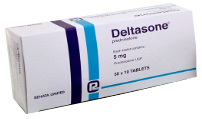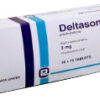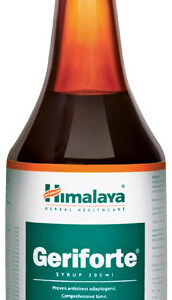Deltasone is a corticosteroid medication that contains the active ingredient prednisone. It is commonly prescribed to treat various inflammatory conditions, such as allergies, asthma, arthritis, and certain types of cancer. Deltasone works by reducing inflammation and suppressing the immune system, providing relief from symptoms associated with these conditions.
It is available in tablet form and should be taken orally with food or milk to minimize stomach upset. The dosage and duration of treatment may vary depending on the specific condition being treated and individual patient factors, therefore it is essential to follow the instructions provided by your healthcare provider.
Restrictions
Deltasone is contraindicated in individuals who have a known hypersensitivity to prednisone or any of the other ingredients in the formulation. It should not be taken by patients with a systemic fungal infection, as corticosteroids can suppress the immune system and worsen the infection. Additionally, it is not recommended for use in patients with certain viral infections such as herpes simplex, chickenpox, or measles.
Caution should be exercised when prescribing Deltasone to individuals with pre-existing conditions such as hypertension, diabetes, osteoporosis, glaucoma, or liver dysfunction. Close monitoring of blood glucose levels, blood pressure, and bone density may be required during treatment.
Potential Side Effects
Like any medication, Deltasone can cause potential side effects. The most common side effects include increased appetite, weight gain, fluid retention, insomnia, and mood changes. Long-term use or high doses of Deltasone can lead to more severe side effects such as osteoporosis, muscle weakness, Cushing’s syndrome, and increased susceptibility to infections.
Other less common but serious side effects may include vision changes, severe abdominal pain or bloating, irregular heartbeat, signs of infection such as fever or persistent sore throat, and mental/mood changes. It is important to notify your healthcare provider if you experience any of these symptoms while taking Deltasone.
Proper Use
When taking Deltasone, it is important to follow the prescribed dosage and schedule provided by your healthcare provider. Generally, it is recommended to take Deltasone with food or milk to minimize stomach upset. Do not increase or decrease the dosage without consulting your doctor.
If you miss a dose, take it as soon as you remember. However, if it is almost time for your next dose, skip the missed dose and continue with your regular dosing schedule. Do not double the dose to make up for a missed one.
An overdose of Deltasone can have serious consequences. If you suspect an overdose, seek immediate medical attention. Symptoms of an overdose may include nausea, vomiting, severe dizziness, fainting, or confusion.
Drug Combinations
| Drug | Interaction |
|---|---|
| Nonsteroidal anti-inflammatory drugs (NSAIDs) | Increased risk of gastrointestinal bleeding |
| Anticoagulants (e.g., warfarin) | Increased risk of bleeding |
| Diuretics | Increased risk of electrolyte imbalance |
| Vaccines | Reduced effectiveness of vaccines and increased risk of complications |
| Certain antifungal medications (e.g., ketoconazole) | Increased concentration of Deltasone in the body |
The Answers You Need
- 1. Can Deltasone be taken during pregnancy or while breastfeeding?
- 2. Can Deltasone cause weight gain?
- 3. Can Deltasone be abruptly stopped?
- 4. Can Deltasone interact with other medications?
- 5. Are there any special precautions for elderly patients?
Deltasone should be used during pregnancy only if the potential benefit justifies the potential risk to the fetus. It can pass into breast milk, so caution should be exercised while breastfeeding.
Yes, weight gain is a potential side effect of Deltasone. It can cause increased appetite and fluid retention, leading to weight gain in some patients.
No, Deltasone should not be abruptly stopped without consulting your healthcare provider. A gradual tapering of the dose is usually recommended to avoid withdrawal symptoms.
Yes, Deltasone can interact with certain drugs, including NSAIDs, anticoagulants, diuretics, vaccines, and certain antifungal medications. It is important to inform your healthcare provider about all the medications you are taking.
Yes, elderly patients may be more susceptible to the side effects of Deltasone, such as osteoporosis and fluid retention. Close monitoring and adjustment of the dosage may be required.






Reviews
There are no reviews yet.